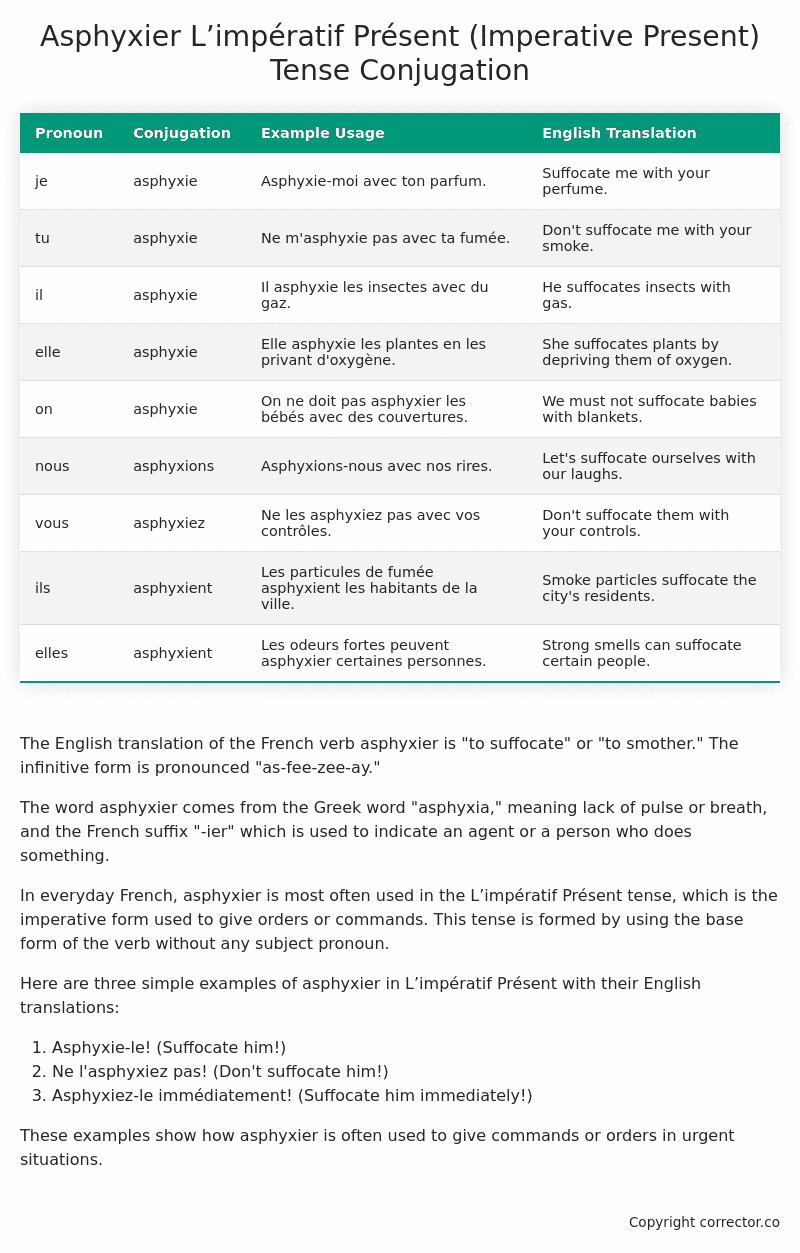L’impératif Présent (Imperative Present) Tense Conjugation of the French Verb asphyxier
Introduction to the verb asphyxier
The English translation of the French verb asphyxier is “to suffocate” or “to smother.” The infinitive form is pronounced “as-fee-zee-ay.”
The word asphyxier comes from the Greek word “asphyxia,” meaning lack of pulse or breath, and the French suffix “-ier” which is used to indicate an agent or a person who does something.
In everyday French, asphyxier is most often used in the L’impératif Présent tense, which is the imperative form used to give orders or commands. This tense is formed by using the base form of the verb without any subject pronoun.
Here are three simple examples of asphyxier in L’impératif Présent with their English translations:
- Asphyxie-le! (Suffocate him!)
- Ne l’asphyxiez pas! (Don’t suffocate him!)
- Asphyxiez-le immédiatement! (Suffocate him immediately!)
These examples show how asphyxier is often used to give commands or orders in urgent situations.
Table of the L’impératif Présent (Imperative Present) Tense Conjugation of asphyxier
| Pronoun | Conjugation | Example Usage | English Translation |
|---|---|---|---|
| je | asphyxie | Asphyxie-moi avec ton parfum. | Suffocate me with your perfume. |
| tu | asphyxie | Ne m’asphyxie pas avec ta fumée. | Don’t suffocate me with your smoke. |
| il | asphyxie | Il asphyxie les insectes avec du gaz. | He suffocates insects with gas. |
| elle | asphyxie | Elle asphyxie les plantes en les privant d’oxygène. | She suffocates plants by depriving them of oxygen. |
| on | asphyxie | On ne doit pas asphyxier les bébés avec des couvertures. | We must not suffocate babies with blankets. |
| nous | asphyxions | Asphyxions-nous avec nos rires. | Let’s suffocate ourselves with our laughs. |
| vous | asphyxiez | Ne les asphyxiez pas avec vos contrôles. | Don’t suffocate them with your controls. |
| ils | asphyxient | Les particules de fumée asphyxient les habitants de la ville. | Smoke particles suffocate the city’s residents. |
| elles | asphyxient | Les odeurs fortes peuvent asphyxier certaines personnes. | Strong smells can suffocate certain people. |
Other Conjugations for Asphyxier.
Le Present (Present Tense) Conjugation of the French Verb asphyxier
Imparfait (Imperfect) Tense Conjugation of the French Verb asphyxier
Passé Simple (Simple Past) Tense Conjugation of the French Verb asphyxier
Passé Composé (Present Perfect) Tense Conjugation of the French Verb asphyxier
Futur Simple (Simple Future) Tense Conjugation of the French Verb asphyxier
Futur Proche (Near Future) Tense Conjugation of the French Verb asphyxier
Plus-que-parfait (Pluperfect) Tense Conjugation of the French Verb asphyxier
Passé Antérieur (Past Anterior) Tense Conjugation of the French Verb asphyxier
Futur Antérieur (Future Anterior) Tense Conjugation of the French Verb asphyxier
Subjonctif Présent (Subjunctive Present) Tense Conjugation of the French Verb asphyxier
Subjonctif Passé (Subjunctive Past) Tense Conjugation of the French Verb asphyxier
Subjonctif Imparfait (Subjunctive Imperfect) Tense Conjugation of the French Verb asphyxier
Subjonctif Plus-que-parfait (Subjunctive Pluperfect) Tense Conjugation of the French Verb asphyxier
Conditionnel Présent (Conditional Present) Tense Conjugation of the French Verb asphyxier
Conditionnel Passé (Conditional Past) Tense Conjugation of the French Verb asphyxier
L’impératif Présent (Imperative Present) Tense Conjugation of the French Verb asphyxier (this article)
L’infinitif Présent (Infinitive Present) Tense Conjugation of the French Verb asphyxier
Struggling with French verbs or the language in general? Why not use our free French Grammar Checker – no registration required!
Get a FREE Download Study Sheet of this Conjugation 🔥
Simply right click the image below, click “save image” and get your free reference for the asphyxier L’impératif Présent tense conjugation!

Asphyxier – About the French L’impératif Présent (Imperative Present) Tense
Usage
Giving commands
Making requests
Offering advice
Expressing desires
Conjugation Formation
Interactions with other tenses
Want More?
I hope you enjoyed this article on the verb asphyxier. Still in a learning mood? Check out another TOTALLY random French verb conjugation!


